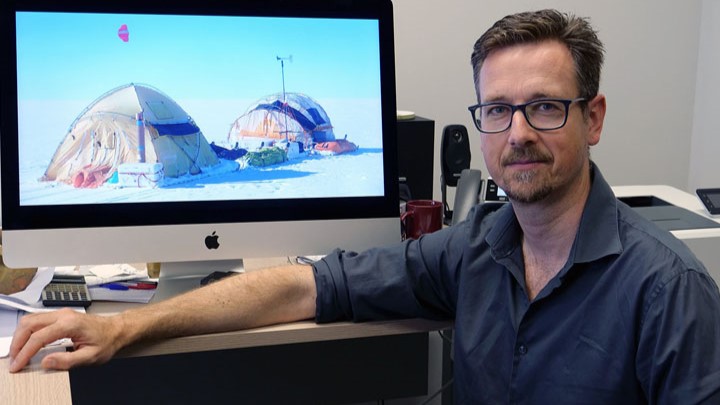Scientists from the European research project Micro4Biogas, coordinated by the University of Valencia professor Manuel Porcar, have discovered and characterized a new taxonomic order of bacteria specialized in the decomposition of organic matter that could be key to improving biogas production. The group, which they have named Darwinibacteriales, is one of the most abundant in biogas production reactors, but had never been characterized in depth
The discovery was made by German, Dutch and Spanish researchers. The latter belonging to the Institute of Integrative Systems Biology (I2SysBio, UV-CSIC) and the company Darwin Bioprospecting Excellence, both institutions located at the Parc Científic de la Universitat de València (PCUV). They took 80 samples of decomposing organic matter from 45 large-scale biogas production plants (in Germany, the Netherlands and Austria) and sequenced their DNA to study their microbial composition. Surprisingly, members of Darwinibacteriales were present in all 80 samples, despite the differences and distance between these plants.
In their study, the scientists were looking for the main microbial players in the process known as anaerobic digestion, by which organic matter is degraded and then transformed into a high-energy gas that is useful as a fuel. This process is considered a 'black box', as the metabolic pathways performed by most of the microorganisms involved are unknown.
Improving biogas production would be a paradigm shift in the energy industry, reducing dependence on fossil fuels and imported energy. But a lack of microbiological research has held the sector back. "This is a very nice example of something that was there, that is fundamental to produce biogas, but that remained hidden," values Manuel Porcar, scientific coordinator of the Micro4Biogas project and co-author of the articles. "Our work shows the tip of a microbial iceberg that is most likely key to biogas production, but which had never been characterized at the genomic level."
Thanks to this discovery, the next step for the Micro4Biogas team will be to create optimized and highly efficient communities of biogas-producing microorganisms. Their goal is to make biogas plants more robust and less dependent on subsidies to operate competitively, which would boost renewable energy worldwide.
"This is a very nice example of something that was there, that is fundamental to produce biogas, but that remained hidden," Manuel Porcar, scientific coordinator of the Micro4Biogas project and co-author of the papers
An ignored group of microorganisms
To understand the composition and diversity of the microbial communities present in all samples collected, a taxonomic analysis was performed by sequencing a specific gene (the 16S rRNA gene) in the entire sample. The results were compared with reference databases to determine which species or taxa were present and their relative abundance.
MBA03 had been identified in previous studies as a group of bacteria not grown in the laboratory, but no one had paid much attention to it. "Usually [this group] was detected by analyzing microbiomes through 16s rRNA gene sequencing," explains Adriel Latorre, head of the Genomics Department at Darwin Bioprospecting and lead author of the study.
To further investigate this unknown group, 30 samples in which the abundance of MBA03 had been confirmed were completely sequenced. "But surprisingly, when we analyzed the complete metagenomes of all 30 samples, we did not detect MBA03 in any of them. This revealed a technical limitation: the genome of this taxon was not available in the databases. From that moment on, our goal was clear: we had to isolate the genome of MBA03 and describe it in depth," says Latorre.
"But, surprisingly, when we analyzed the complete metagenomes of the 30 samples, we did not detect MBA03 in any of them. This revealed a technical limitation: the genome of this taxon was not available in the databases. From that moment on, our goal was clear: we had to isolate the genome of MBA03 and describe it in depth," Adriel Latorre, head of the Genomics Department at Darwin Bioprospecting and lead author of the study
Using the Micro4Biogas dataset, phylogenetic and phylogenomic reconstructions corroborated that MBA03 constitutes a new order, i.e. the taxonomic group above family, genus and species. The new order has been named Darwinibacteriales.
Scientists suspect that one particular family within this new order, the Darwinibacteriaceae, works in mutualistic collaboration with archaea, another type of microorganism involved in anaerobic digestion. The bacteria produce metabolic compounds that the archaea use to generate methane gas. If this relationship is confirmed, these bacteria will be the main target for developing strategies to increase and improve biogas production.
Micro4Biogas Project
Micro4Biogas is an EU-funded project (H2020, grant agreement number 101000470) working on the development of customized microbial consortia to increase biogas production.
Bringing together 15 institutions from 6 countries (including universities, companies and the local government of a Spanish city where a state-of-the-art biogas plant will be built), the project aims to increase the yield, speed, quality and reproducibility of biogas production, consolidating this renewable energy as an environmentally, politically and economically viable option.
News


